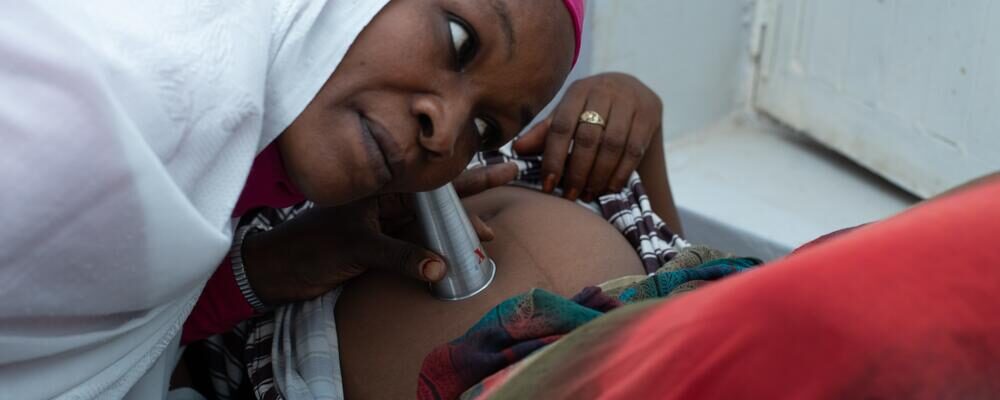Emergency mobile health care for expectant mothers and babies
Sudan | 2023 | CERF
Sudan, Kosti. Lubna still remembers the sound of shelling in Khartoum, Sudan’s capital city, in March 2023. The 34-year-old mother was pregnant at the time. “I was wondering how I can guarantee the safety of my unborn child, my other children and myself,” she recalled in October. “Who will give me a helping hand in these terrible circumstances? I did not know what to do.”
Lubna and her family were among the millions who fled Khartoum following the outbreak of violence in April 2023. Since then over 8.1 million people have been displaced inside and outside Sudan; and nearly 25 million people – more than half of them children – need humanitarian assistance.
Immediate medical help
As soon as fighting began, using funding from CERF and other sources, UNFPA deployed mobile clinics to displacement sites across the country to reach women and girls with prenatal care, STI testing and treatment, and other obstetrical health care.
The clinics are staffed by a doctor, laboratory technician, midwives, and a pharmacist, and are sent to areas where people moved to across the country.
While humanitarian needs were growing, medical supplies were limited, and protection risks on the rise. And, for thousands of pregnant women like Lubna, the situation was even more difficult.
In June 2023, Lubna and her family scraped together the money they needed to flee Khartoum. At seven months pregnant, she made the arduous 15-hour journey by bus to Kosti, in White Nile State, taking refuge in a school at the Ezzedine displacement site.
Living with her children in this temporary refuge has been challenging, but one thing Lubna did not have to worry about was reproductive health care. Immediately on arrival, Lubna received medical attention at a UNFPA-supported mobile clinic, including an examination, medication, and psychosocial support. Thereafter, she was able to receive routine care.
“Lubna had frequent pregnancy checks at the clinic,” said Aisha, a midwife at the mobile clinic. Lubna also received a clean delivery kit, containing sterile supplies to facilitate a safe birth. The kits are given out in case women end up delivering at home or in a poorly equipped facility.
Fortunately, Lubna was able to deliver at the clinic: on 12 September, Lubna gave birth to a healthy baby girl.
“Lubna was one of the first patients we registered with the reproductive health mobile clinic,” said Dr. Ruaa, who works there. “We hope that all pregnant women in the gathering site are able to give birth safely.”
October 2023
Adapted from original stories from UNFPA
For more information on the CERF allocation, and allocation data on the CERF Data Hub.
